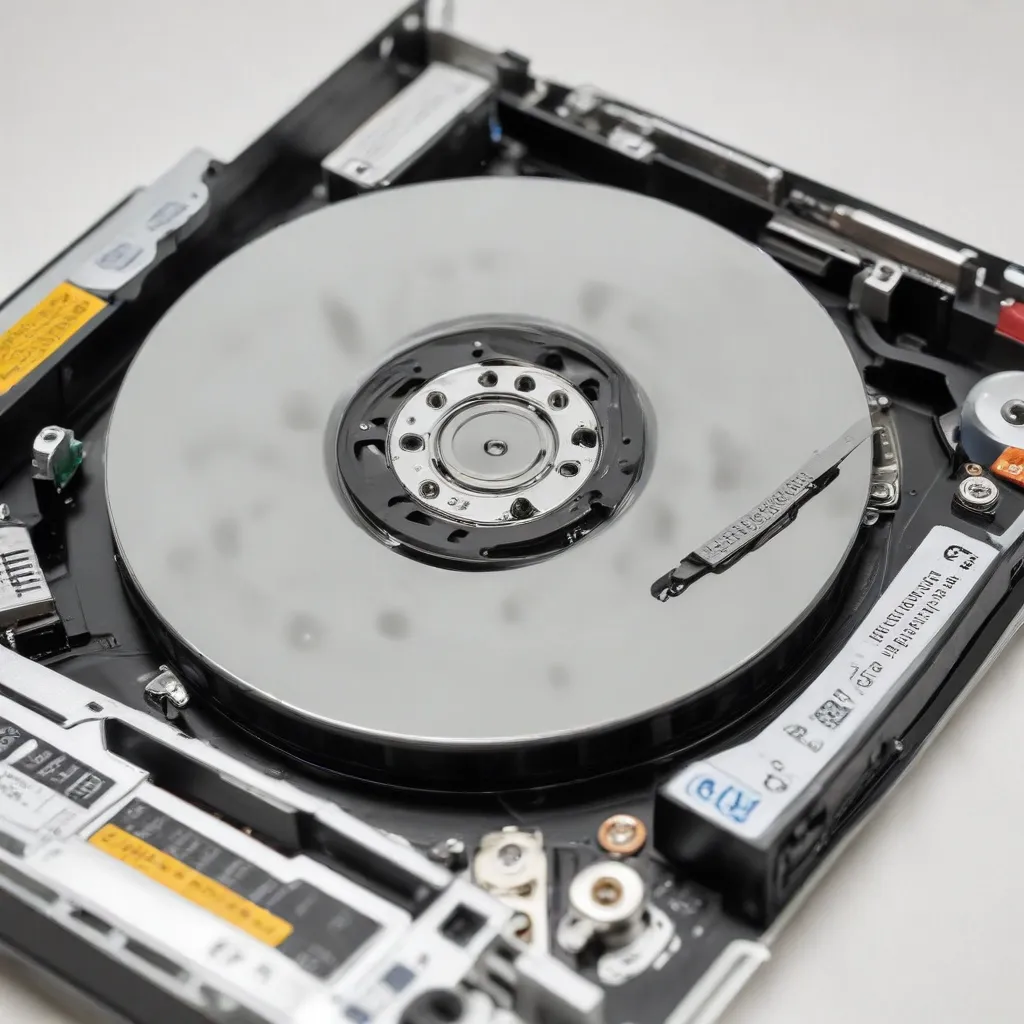Computer Hardware
Disk Drives
Disk drives, whether in the form of traditional hard disk drives (HDDs) or solid-state drives (SSDs), are essential components of modern computing devices. These storage devices are responsible for housing our data, applications, and operating systems, making them a crucial part of any computer system.
Disk drives come in various types, each with its own unique features and capabilities. HDDs rely on spinning platters and read/write heads to access data, while SSDs utilize flash memory to provide faster data access and retrieval. Both types of disk drives have their own strengths and weaknesses, and the choice between them often depends on the specific needs and requirements of the user.
Disk Drive Components
At the core of a disk drive lies a complex array of components, including the spindle, platters, read/write heads, and actuator arm. In the case of an HDD, the spindle motor rotates the platters at high speeds, allowing the read/write heads to access data stored on the magnetic coating of the platters. For SSDs, the flash memory chips and the controller are the key components that enable fast and reliable data storage and retrieval.
Understanding the inner workings of disk drives is essential for troubleshooting and repair, as it helps identify the root causes of common issues and determine the appropriate course of action.
Disk Drive Failures
Common Disk Drive Issues
Disk drives, like any other hardware component, are susceptible to various types of failures. Some of the most common issues include:
- Mechanical Failures: This can include spindle motor issues, head crashes, or platter damage in HDDs, or controller or flash memory chip failures in SSDs.
- Firmware/Software Errors: Corrupted firmware or issues with the disk drive’s operating software can lead to read/write errors, data loss, or the inability to access the drive.
- Logical Errors: File system corruption, partition table issues, or other logical problems can prevent the operating system from properly recognizing and interacting with the disk drive.
- Physical Damage: Physical trauma, such as drops or impacts, can cause physical damage to the disk drive components, leading to data loss and malfunctions.
Disk Drive Troubleshooting
When faced with a malfunctioning disk drive, it’s important to follow a systematic troubleshooting process to identify the root cause of the issue. This may involve running diagnostic tools, checking connections, and isolating the problem to a specific component or subsystem.
In some cases, the issue may be related to the operating system or the way the disk drive is being accessed, and troubleshooting may require a deeper understanding of the system’s boot process, file system, and partition management.
Disk Drive Repair
Repair Techniques
Disk drive repair can be a complex and delicate process, and the approach taken will depend on the nature and severity of the issue. In some cases, a simple software-based solution, such as running disk repair utilities or updating firmware, may be sufficient to address the problem. However, in more severe cases, physical repairs or component replacement may be necessary.
DIY Disk Drive Repair
For the more tech-savvy users, attempting a DIY disk drive repair can be a rewarding experience. However, it’s important to exercise caution, as improper handling or disassembly can further damage the drive and lead to data loss. If you decide to take on a DIY repair, it’s crucial to follow detailed guides, have the necessary tools and equipment, and be prepared to seek professional help if the issue proves too complex.
Professional Disk Drive Repair Services
For those who are not comfortable with DIY repairs or when the issue is beyond the scope of a home-based solution, seeking the help of professional disk drive repair services can be the best course of action. These specialized technicians have the knowledge, tools, and clean-room facilities to safely diagnose and repair even the most complex disk drive problems, minimizing the risk of further damage and data loss.
Preventive Maintenance
While disk drive failures can sometimes be unavoidable, there are steps you can take to prolong the lifespan of your storage devices and reduce the likelihood of issues.
Disk Drive Care and Handling
Proper care and handling of disk drives, whether HDDs or SSDs, is essential. Avoid exposing the drives to physical shocks, vibrations, or extreme temperatures, and ensure that they are stored and transported in a safe manner.
Backup and Data Recovery
Regular backups of your important data are crucial, as they provide a safety net in the event of a disk drive failure. Consider implementing a comprehensive backup strategy, which may include local storage, network-attached storage (NAS), or cloud-based solutions. Additionally, familiarize yourself with data recovery tools and techniques, as they can be invaluable in the event of data loss.
Operating System Considerations
File System Integrity
The integrity of the file system on your disk drive is crucial for the proper functioning of your computer. Proper disk partitioning and formatting, as well as regular file system checks and maintenance, can help ensure that your data is accessible and protected.
Disk Partitioning
Disk partitioning involves dividing a physical disk into one or more logical volumes, each with its own file system. This allows for more efficient storage and management of data, as well as the ability to separate different types of files or operating systems.
Disk Formatting
Formatting a disk drive initializes the file system and prepares the storage medium for data storage. Different file system formats, such as FAT32, NTFS, or exFAT, have their own unique characteristics and are suitable for different use cases.
Boot Process
The boot process, which involves the transition from the system’s power-on state to a fully operational state, is closely tied to the disk drive’s role in the system.
Master Boot Record (MBR)
The Master Boot Record (MBR) is a crucial part of the boot process, as it contains the information needed to load the operating system and initiate the boot sequence. Issues with the MBR can prevent the system from booting properly.
BIOS and UEFI
The Basic Input/Output System (BIOS) or the Unified Extensible Firmware Interface (UEFI) are the firmware interfaces responsible for initializing and configuring the hardware during the boot process, including the disk drive. Ensuring that the BIOS or UEFI is properly configured and up-to-date can help prevent boot-related issues.
Data Recovery
Recovering Lost Data
In the event of a disk drive failure or data loss, data recovery can be a complex and delicate process. Specialized data recovery software and services can be invaluable in retrieving important files and information.
Data Recovery Software
There are a variety of data recovery software tools available, both free and commercial, that can scan disk drives and attempt to recover lost or deleted files. These tools can be particularly useful for logical or software-related data loss scenarios.
Data Recovery Services
For more severe cases of data loss, such as physical disk drive damage or complex logical issues, professional data recovery services may be the best course of action. These specialized service providers have the equipment, expertise, and clean-room facilities to safely recover data from even the most challenging situations.
Preventing Data Loss
The best approach to data recovery is to prevent data loss in the first place. Implementing a robust backup strategy is crucial for ensuring the safety and availability of your important files and information.
Backup Strategies
Effective backup strategies may include local storage solutions, such as external hard drives or network-attached storage (NAS) devices, as well as cloud-based storage and backup services. Regularly backing up your data can provide a safety net in the event of a disk drive failure or other data loss scenario.
Cloud Storage Solutions
Cloud storage services offer a convenient and scalable way to store and protect your data. By leveraging the cloud, you can access your files from anywhere, while also benefiting from the data redundancy and security measures provided by the service.
Disc drive repair and maintenance can be a complex and ever-evolving topic, but with the right knowledge and approach, you can keep your computer systems running smoothly and your data safe. By understanding the components of disk drives, troubleshooting common issues, and implementing effective data backup and recovery strategies, you can be better prepared to handle any disk drive-related challenges that may arise.
Remember, when in doubt, don’t hesitate to seek the assistance of professional disk drive repair services. Their expertise and specialized equipment can be invaluable in restoring your data and getting your system back up and running.
For more information on computer hardware, software, and IT solutions, be sure to visit our website at https://itfix.org.uk/computer-repair/. Our team of experts is always ready to provide you with the guidance and support you need to keep your technology running at its best.













